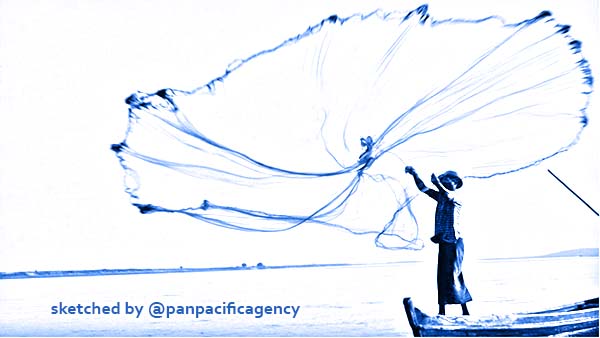China’s approaches toward issues relating to aquatic biological resources conservation

A fisherman casts his net on the Irrawaddy, seen by many as the soul of the nation. Photo: Pinterest. Sketched by the Pan Pacific Agency.
BEIJING/MOSCOW, Dec 22, 2020, Pan Pacific Agency. Over the last years in China, there has been a tendency towards an increasing number of the widespread use of prohibited fishing gear for aquatic biological resources by Chinese fishermen. It has been claimed that the most dangerous method for the fauna of Inland watercourses and Transboundary Waters is the fishing method by the gear that uses an electrical current.
In order to highlight the existence of the danger, there are some results of researches conducted by American and European scientists.
According to Darel Snyder (Colorado State University, USA), an American author of the famous survey entitled “Electrofishing and its harmful effects on fish reproduction, early life stages, growth, and larval development”, electrofishing is dangerous not only for fish, but also for other aquatic organisms as well as animals that are located near the areas where it is used. Scientists have proved that the use of electric gear for fishing aquatic biological resources undoubtedly affects fish reproduction.
Moreover, it has been acknowledged by Jonh Wullschleger (Olympic National Park, USA), an American scientist, who observed some fish that were injured their spinal fractures as a result of a rapid contraction of paravertebral muscles due to an intense electrical current effect.
David Coombes (B.C. Environment, USA), an American ecologist, has written that he has observed thousands of dead insect larvae near the shore of a “salmon river” as a result of electrofishing. Therefore, the electric current may cause harmful effects on fish, and at the same time, its food supply can also be damaged.
Over the past decade, a number of measures taken by Chinese Government to resolve illegal activities relating to electrofishing demonstrate the relevance of this issue for China. Thus, fishing in China is currently regulated by the Act of 20 January 1986, as amended on 28 December 2013, entitled “Fishing Industry”.
Under this Act fishing with electricity is not a permissible method and therefore is illegal. The Article 38 of the Chapter 5 of the Act prescribes administrative liability in the form of seizure of catch and income obtained from illegal activities, moreover, an administrative fine of up to 50 thousand yuan. In addition, the Article prescribes seizure of fishing gear and a fishing vessel, annulment of fishing license, in case when aggravating circumstances are present. Moreover, an inspection activity is annually conducted by inter-agencies in order to reveal any actions of illegal electrofishing in China.
Driven by rapidly rising of the fishing industry and supported by China’s fishing policies, Chinese government authorities have given priority relating to the issue to establish control in particular inner areas along Yangtze River basin located in Hunan Province, Hubei Province, Anhui Province, and Zhejiang Province. In order to minimise risks caused by electrofishing and other potential hazards for aquatic biological resources, there has been established Oppose Electrofishing Union as the Department of China Biodiversity Conservation and Green Development Foundation. The Union provides assistance to local authorities within the issues against illegal electrofishing, and supports strengthening of legislation to the relevant issues in China.
Furthermore, the analysis of available data shows that the crucial issue concerning electrofishing is highly relevant not only for Inland watercourses, but also for Transboundary China’s watercourses with other countries. In order to illustrate this statement, according to the annual statistics provided by the government authorities, there is a number of cases of the use of electrofishing gear by fishermen on boundary rivers with the Russian Federation, such as the Amur (Chinese: Heilonggjiang), and the Ussuri (Chinese: Ussuligjiang).
In this context, it should be considered that legal sale of replacement parts for prohibited electrofishing gear, moreover, low attention paid by Chinese authorities to ecosystems may lead to severe environmental consequences and damage water ecosystems in inner China, but also may affect interests of other boundary countries.